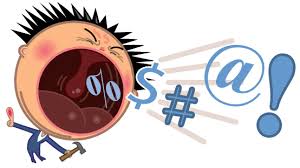swear
英 [sweə]
美 [swɛr]
- vt. 发誓;咒骂
- vi. 发誓,宣誓;诅咒
- n. 宣誓;诅咒
CET4 TEM4 IELTS GRE 考 研 CET6
1. 誓(s)言是要穿着(wear)正规礼服进行庄严发誓的。
2. 蛇穿好衣服,去发誓。是不是有点儿像沐猴而冠啦?
3. answer => swear.
swear 发誓,咒骂,诅咒来自古英语 swerian,发誓,来自 Proto-Germanic*swarjana,说,发誓,来自 PIE*swer,说,讲。 引申词义咒骂,诅咒。
- swear
- swear: [OE] Swear is a general Germanic word, with relatives in German schwören, Dutch zweren, Swedish svärja, and Danish sverge. They all go back to a prehistoric Germanic *swarjan, a derivative of the base *swar-, which also lies behind the second syllable of English answer. And this in turn may come ultimately from the same Indo-European base as produced English sermon. The verb’s original meaning was ‘take an oath’; its use for ‘curse, blaspheme’ dates from the 15th century.
=> answer - swear (v.)
- Old English swerian "take an oath" (class VI strong verb; past tense swor, past participle sworen), from Proto-Germanic *swarjan-, (cognates: Old Saxon swerian, Old Frisian swera, Old Norse sverja, Danish sverge, Middle Dutch swaren, Old High German swerien, German schwören, Gothic swaren "to swear"), from PIE root *swer- (1) "to speak, talk, say" (cognates: Old Church Slavonic svara "quarrel," Oscan sverrunei "to the speaker").
Also related to the second element in answer. The secondary sense of "use bad language" (early 15c.) developed from the notion of "invoke sacred names." Swear off "desist as with a vow" is from 1898. Swear in "install in office by administration of an oath" is from 1700 in modern use, echoing Old English.
- 1. He has been brought up not to swear in front of women.
- 他从小就被教育不要在女性面前说脏话。
来自柯林斯例句
- 2. Many people swear by vitamin C's ability to ward off colds.
- 许多人深信维生素C能预防感冒。
来自柯林斯例句
- 3. I swear I've told you all I know.
- 我发誓我已经把我所知道的全都告诉你了。
来自柯林斯例句
- 4. It is totally unacceptable for children to swear.
- 孩子说脏话是完全不能容忍的。
来自柯林斯例句
- 5. It's wrong to swear and shout.
- 破口大骂是不对的.
来自柯林斯例句
[ swear 造句 ]
